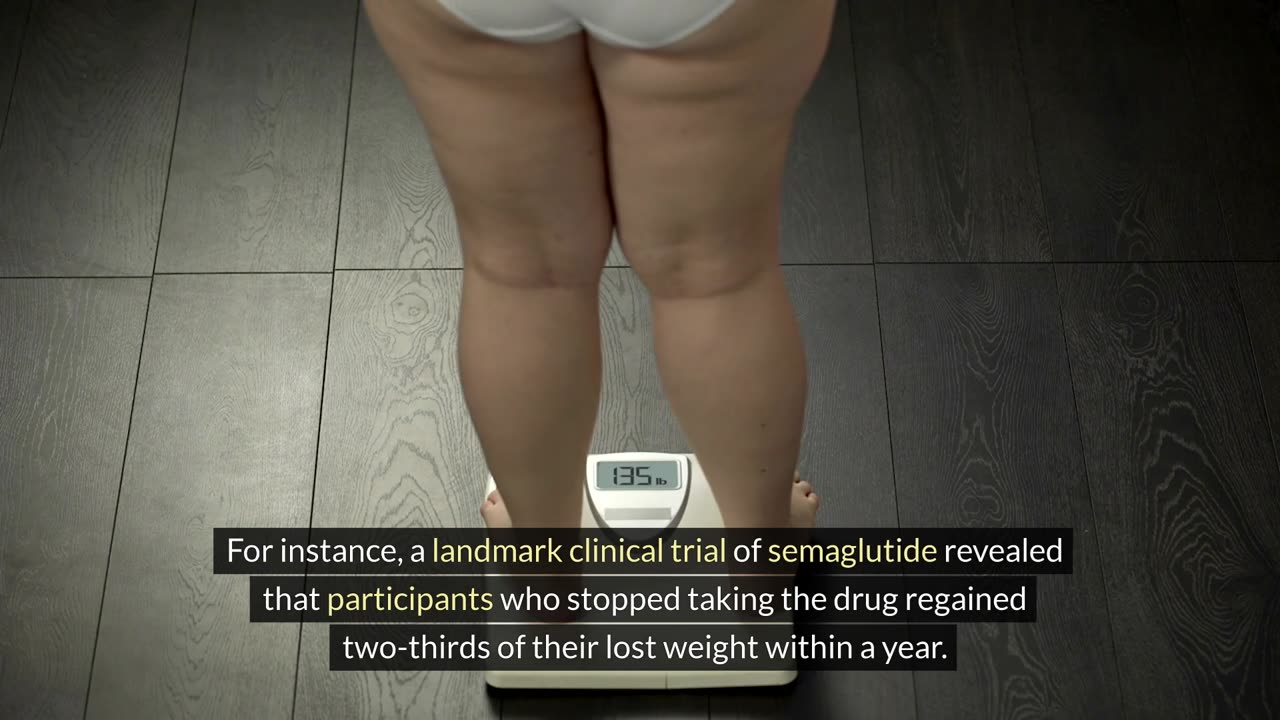Premium Only Content

The Long Road Ahead: The Challenges of Stopping Weight-Loss Drugs
For many struggling with obesity, weight-loss drugs like Ozempic, Wegovy, and Mounjaro have been hailed as miraculous solutions. These medications have enabled countless individuals to shed significant pounds, but the journey doesn't end there. What happens when the medication stops? The unsettling reality is that most people regain the weight they lost, posing critical questions about long-term health and the nature of obesity itself.
### Understanding the Weight Loss Drug Phenomenon
#### The Rise of GLP-1 Agonists
GLP-1 agonists, such as semaglutide (marketed as Wegovy and Ozempic) and tirzepatide (Mounjaro), have revolutionized the weight-loss industry. These drugs mimic a natural gut hormone that promotes satiety, leading to significant weight reduction in patients. Clinical trials have shown remarkable results: participants lost an average of 15% of their body weight over 68 weeks, with some shedding up to 20%. However, these impressive outcomes come with a high cost—both financially and in terms of potential side effects like nausea and stomach pain.
#### The Cost and Side Effects
Despite their effectiveness, GLP-1 drugs are expensive, with a monthly supply of Wegovy costing around $1,350. This high price, combined with side effects such as nausea, stomach pain, and heartburn, makes long-term use challenging for many. Moreover, the real test begins when patients stop taking these medications, often leading to rapid weight regain.
### The Rebound Effect: Why Weight Returns
The Brain's Role in Appetite Regulation
The primary reason for weight regain after stopping GLP-1 drugs lies in the brain's regulation of appetite. These medications only mask the underlying dysregulation in brain regions responsible for hunger and satiety. Once the drug is discontinued, the brain reverts to its previous state, and food cravings return, leading to weight gain.
The GLP-1 Deficit Theory
Another theory suggests that the high doses of GLP-1 provided by these drugs might suppress the body's natural ability to produce this hormone. When the medication is stopped, the body experiences a GLP-1 deficit, significantly impacting the brain's satiety signals. This could explain the rapid and often substantial weight regain observed in many patients.
The Health Implications of Weight Regain
Changes in Body Composition
Weight regain isn't just about the numbers on the scale. When people regain weight, it often involves more fat and less muscle, a shift that can be detrimental to metabolic health. This change in body composition increases the risk of conditions like diabetes and heart disease, complicating the patient's health journey even further.
Cardiometabolic Health
Regaining weight also impacts cardiometabolic health. Studies show that as patients regain weight, markers such as waist circumference—which correlates with risk for heart disease and insulin resistance—return to their original levels. This suggests that the health benefits gained during weight loss may diminish over time if the weight is not maintained.
The Search for Sustainable Solutions
Chronic Medication for a Chronic Illness
Experts like Domenica Rubino emphasize that obesity, much like hypertension or diabetes, requires chronic medication. The perception of GLP-1 drugs as temporary fixes must shift to viewing them as long-term treatments. The challenge is to find sustainable strategies to maintain weight loss while minimizing side effects and costs.
Maintenance Doses and Combination Therapies
One proposed solution is the use of higher doses during the acute phase of weight loss, followed by lower maintenance doses. This approach aims to sustain weight loss with fewer side effects. Additionally, combination therapies involving different medications might offer a more balanced and long-term solution to managing obesity.
The Future of Weight Management
Advances in Personalized Medicine
Ongoing research aims to develop personalized treatment plans based on individual responses to medications. By identifying predictors through blood tests and psychological assessments, doctors could tailor treatments more effectively, reducing the trial-and-error approach currently in use.
#### Generic Alternatives and Cost Reduction
The high cost of GLP-1 drugs remains a significant barrier, but the impending availability of generic alternatives offers hope. With patents for drugs like Saxenda expiring, lower-cost options could become widely available, making long-term medication more accessible.
The journey of weight management with GLP-1 drugs is complex and fraught with challenges. While these medications offer remarkable results, the reality of weight regain after stopping treatment highlights the chronic nature of obesity. Sustainable, long-term solutions require a shift in perception, ongoing research, and innovations in personalized medicine. Only through these efforts can we hope to provide lasting relief and improved health outcomes for those struggling with obesity.
-
 29:38
29:38
Uncommon Sense In Current Times
14 hours ago $0.20 earnedIs Doubt a Sin? Wrestling with Faith & Belief (Part 1) | Dr. Randal Rauser
10K5 -
 8:29
8:29
The Art of Improvement
20 hours ago $0.14 earned4 Strategies To Accelerate Your Personal Growth By 200%
3.72K1 -
 LIVE
LIVE
The Bubba Army
22 hours agoTrump Pardoning Diddy? - Bubba the Love Sponge® Show | 7/30/25
1,987 watching -
 10:53
10:53
Nikko Ortiz
1 day agoWORST Clips On The Internet
63.5K23 -
 27:44
27:44
DeVory Darkins
17 hours ago $6.31 earnedCHILLING update regarding NYC shooter Lefties LOSING IT over Sydney Sweeney
18.3K87 -
 10:05
10:05
MattMorseTV
16 hours ago $11.81 earnedHe actually did it...
81.4K39 -

Midnight In The Mountains
2 hours agoMorning Coffee w/ Midnight & The Early Birds of Rumble | Tsunami's Railing Cali ...
4.81K1 -
 2:20:02
2:20:02
Side Scrollers Podcast
21 hours agoSYDNEY SWEENEY JEANS CONTROVERSY BREAKS THE INTERNET + TWITCH APOCALYPSE + MORE | SIDE SCROLLERS
82.5K15 -
 3:10:02
3:10:02
Price of Reason
15 hours agoTrump Tariffs Are GOOD? Syndey Sweeney Faces WOKE Backlash! Fantastic Four FLOPS! Mouthwashing BAN!
10.7K8 -
 2:04:55
2:04:55
svgames
3 hours ago🟢LIVE - TRIVIAA
7.57K1